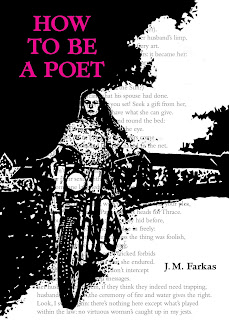Written by J.M. Farkas
Reviewed by Diana Iozzia
Farkas uses seven bottles of white correction fluid to mark out about 90 percent of the poem, leaving words out that help make a cohesive poem for herself. Her encompassing poem sets out to teach the reader how to be a poet, using the secluded words to create metaphors and personification.
Personally, this is not a type of poetry that I had delved into before. In reading the pages and thinking how many of Ovid's words had been manipulated, I found myself drawing a dislike for this style of poetry. I think using someone else's poetry in this way is a bit cheap. Although her final poem reads nicely in a style of poetry I would read, I do not like the entire poetry style.
The second half of the book is Ovid's original poem, but Farkas's poem's words typed in a bold font. I personally did not enjoy this section, because I do not enjoy Ovid's poetry. I felt that this book used a certain level of effort that just does not appeal to me. I feel that the creation of this book feels disengenious, taking advantage of the source material.
I would not recommend reading this book. I do not plan to continue reading Farkas's work.
I received a complimentary copy of this book in exchange for reading and reviewing purposes. Thank you to Andrews McMeel Publishing for the opportunity.





